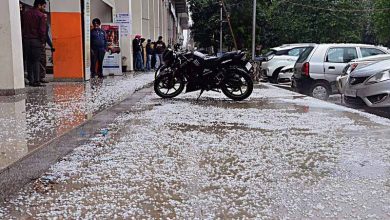GENEVA: WHO termed Covid strain JN.1 as ‘variant of interest’ due to its rapid spread

GINEBRA: The World Health Organization has classified the JN.1 strain of COVID-19 as a “variant of interest” given its rapid spread, but said it poses a “low” risk to global public health. represents.
The variant JN.1 was previously classified as a variant of interest (VOI) as part of sublineage BA.2.86, the main lineage that is classified as a VOI, the World Organization said on Tuesday.
However, in the past weeks, JN.1 is being reported in several countries and its prevalence has increased rapidly globally.
India has also recorded its first case of the variant JN.1.
Now represents the vast majority of descendants of BA.2.86 as reported by the Global Initiative for Sharing All Data on Influenza (GISAID), according to the World Health Organization (WHO).
“Due to its rapid spread, OMS is classifying JN.1 as a variant of interest (VOI) separate from the parent lineage BA.2.86,” the world health body said in a publication in the journal X.
The OMS has assessed the additional risk to global public health that JN.1 represents as “low according to the available but limited evidence”, but warned: “It is estimated that this variant of SARS-CoV-2 The surge in cases could come “amid a surge in infections of other viral and bacterial infections, especially in countries entering the winter season”.
The variant JN.1 has been reported in EE. According to the Ministry of Health and Family Welfare of India, U.U., China, Singapore and India.
Seven cases of this variant have been reported in China.
According to the Health Ministry (MS), the virus has led to a surge in cases in several countries, including Singapore, which recorded a 75 per cent increase with 56,043 cases last week.
The ministry said most of the rising cases in the city-state are infected with the JN.1 variant.
The first case of JN.1 in India was detected on December 8 in a sample taken from a 79-year-old woman in Kerala with symptoms.
Earlier, it was revealed that a traveler from Tiruchirappalli district of Tamil Nadu was infected with the JN.1 variant in Singapore.
Union Health Minister Mansukh Mandaviya on Wednesday reviewed the preparedness of health facilities and directed states to remain alert and increase surveillance.
Assuring the states that they will get full support from the Centre, he said, ‘We need to be cautious, but there is no need to panic.
In a letter to states and territories, Union Health Secretary Sudhansh Pant on Monday urged states to guarantee effective compliance with the detailed operational guidelines for the revised surveillance strategy for COVID-19, as shared Has been done By the Union Ministry of Health and Family Welfare.
He also recommended that they ensure adequate testing as per the COVID-19 testing standards in all districts and maintain the recommended ratio of RT-PCR and antigen tests.
Pant also added details about the variant in an attachment, confirming that JN.1 (BA.2.86.1.1) will emerge in the 2023 finals and is a descendant of the BA.2.86 (Pirola) lineage that is the carrier of SARS-CoV2. B. A. 2.86. More than 30 mutations in the protein spike (5), indicating a high capacity for immune evasion.
The annex states that it is not currently known whether JN.1 infection causes different symptoms from other variants.
In general, symptoms of COVID-19 are similar across all variants and there are no indications of severity greater than JN.1.
Existing treatment lines for COVID-19 are expected to be effective against JN.1 infection, he said, and updated vaccines are expected to increase protection against the variant.
In late 2020, the emergence of variants posing a greater risk to global public health prompted OMS to prioritize surveillance and investigation globally and to inform and adjust the response to variants of concern (VoI) and variants of concern (VOC). Prompted to mark in. COVID-19.




